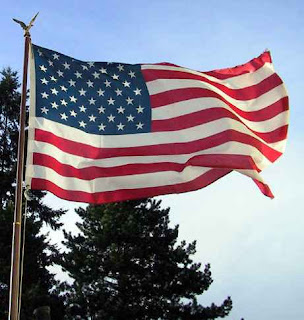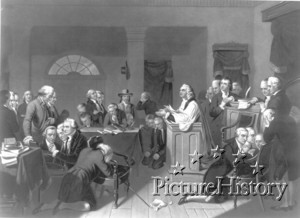Saturday, December 24, 2011
"Christian Nation" Part X (The Bible and the Clergy)
First From Julie's Keyboard: What
more could we say today? He came, He loved, He died and He rose again
to give us the Greatest Gift mankind has ever known! May we make Him
the Celebrated Savior in this Season and Always!
What
more could we say today? He came, He loved, He died and He rose again
to give us the Greatest Gift mankind has ever known! May we make Him
the Celebrated Savior in this Season and Always!Blessings to you all our friends! And, to all a very Merry Christimas!
Happy Birthday to the Savior of the World,
Julie
Isaiah 7:14 "Therefore the Lord himself shall give you a sign; Behold, a virgin shall conceive, and bear a son, and shall call his name Immanuel."
Immanuel - "our God is with us"
******************************
"Christian Nation" Part X (The Bible and the Clergy)
As we continue our trek across our religious Christian history, we need not progress any further without the mention of the influence of the Bible and Clergy in America. If we are going to ascribe to the name "Christian Nation", surly they and it must have had a prominent place in our society.
I agree the accounts which follow occurred before the signing of the United States Constitution, but I present them as a means to describe and lay the foundation for the societal view and general sentiment of the mind of the people and their leaders leading up to the Constitutional Convention, which we will deal with later in our trek.
A year after the signing of the Declaration of Independence America began experiencing a shortage of Bibles. On July 7th, 1777, a request was placed before Congress to print or to import more. That request was referred to a committee of Daniel Roberdeau, John Adams, and Johnathan Smith.
On September 11th they reported to Congress:
 "That
the use of the Bible is so universal, and its importance so great . . .
your Committee recommend that Congress will order the Committee of
Commerce to import 20,000 Bibles from Holland, Scotland, or elsewhere,
into the the different ports of the States of the Union." - - - - Journals of . . . Congrress (1907), Vol. VIII, p. 734, September 11, 1777.
"That
the use of the Bible is so universal, and its importance so great . . .
your Committee recommend that Congress will order the Committee of
Commerce to import 20,000 Bibles from Holland, Scotland, or elsewhere,
into the the different ports of the States of the Union." - - - - Journals of . . . Congrress (1907), Vol. VIII, p. 734, September 11, 1777.It is significant that Congress agreed and approved the measure, for it establishes for us the dept of their Christian commitment. In the struggles of war and the shortages that such produce, it is unlikely that a nation without a deep Christian Commitment will spend deeply needed financial resources on 20,000 Bibles. It demonstrates to us that their Faith was not in political word only, but was emanating from their heart.
On October 31, following the victories of Bennington, Stillwater, Saratoga, and some others, Congress appointed Samuel Adams, Richard Henry Lee, and Daniel Roberdeau to draft a proclamation for a national day of prayer and thanksgiving. On November 1, 1777, their proclamation was approved:
"Forasmuch as it is the indispensable duty of all men to adore the superintending providence of Almighty God; to acknowledge with gratitude their obligation to Him for benefits received and to implore such farther blessings as they stand in need of . . . humble and earnest supplication that it may please God, through the merits of Jesus Christ, mercifully to forgive and blot our sins out of remembrance . . . and to prosper the means of religion of the promotion and enlargement of that kingdom which consisteth 'in righteousness, peace, and joy in the Holy Ghost.'" - - - - Journals of Congress (1907), Vol. IX, 1777, pp. 854-855, November 15, 1777.
It is hard for us to today to comprehend society with this world view, yet it was the sentiment of our nation and our people, it was who we were. The understanding for our purpose and it's justice and cause was all viewed through the precepts of Christian Scripture. Although it is 180 degrees reverse from where we are today, it did exemplify the attributes of a Christian Nation and a Christian people! It was this Nation and people that conceived and gave birth to the United States Constitution, it is unlikely such a Constitution would embody any concept that would restrict this world view that was deemed so important.
As the war continued the shortage of Bibles remained a problem. This issue was deemed so important to our nation that Robert Aitken petitioned Congress on January 21, 1781 for permission to print the Bibles on his presses here in America rather than import them. In his arguments to Congress he pointed out what a neat edition of the Holy Scriptures they would be for the use of schools.
Congress approved his request and appointed a committee of James Duane, Thomas McKean, and John Witherspoon to oversee the project. In it's final stage of readiness in late summer of 1782, James Duane, chairman of the Congressional committee, reported to Congress:
Speaking of Mr. Aitken, "He undertook this expensive work at a time when from the circumstances of the war an English edition of the Bible could not be imported, nor any opinion formed how long the obstruction might continue. On this account particularly he deserves applause and encouragement." - - - - Journals of . . . Congress (1914), Vol. XXIII, p. 573, September 1, 1782.
On September 12, 1782, the full Congress approved the Bible which soon began rolling off the presses. Printed in the front of that Bible (the first English language Bible ever printed in America) was this Congressional endorsement:
Whereupon, Resolved, That the United States in Congress assembled . . . recommend this edition of the Bible to the inhabitants of the United States. - - - - Journals of . . . Congress (1914), Vol. XXIII, p. 574, September 12, 1782.
Next week we will try to look at the Clergy and their place in this American society, untill then let may say a very Merry Christmas to each and everyone!
God bless each of you,
David




No comments:
Post a Comment